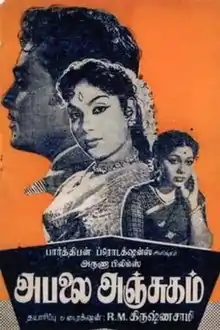Abalai Anjugam
Abalai Anjugam (transl. Helpless Anjugam) is a 1959 Indian Tamil-language film produced and directed by R. M. Krishnaswamy.[2] The film stars T. R. Mahalingam and Sowkar Janaki.[3]
| Abalai Anjugam | |
|---|---|
 Poster | |
| Directed by | R. M. Krishnaswamy |
| Produced by | R. M. Krishnaswamy |
| Screenplay by | A. L. Narayanan |
| Story by | Ki. Ra. Gopalan |
| Based on | Abalai Anjugam Novel by Ki. Ra. Gopalan |
| Starring | T. R. Mahalingam Sowkar Janaki V. R. Rajagopal T. A. Madhuram M. N. Rajam |
| Music by | K. V. Mahadevan |
| Cinematography | P. Madhusoodhana Rao |
| Edited by | R. M. Venugopal |
Production company | Aruna Films |
| Distributed by | Parthiban Productions |
Release date |
|
Running time | 177 mins. (15970 ft.) |
| Country | India |
| Language | Tamil |
Plot
It is the story of a helpless young woman, Anjugam, who is pushed into great difficulties including a charge of theft. However, she overcomes them and the story has a happy ending.[4]
Cast and crew
The lists are compiled from the review article in The Hindu[4] and from the database of Film News Anandan.[1]
Cast
|
|
Crew
- Producer &
- Director: R. M. Krishnaswamy
- Story: Ki. Ra. Gopalan
- Dialogues: A. L. Narayanan
- Cinematography: P. Madhusoodhana Rao
- Editing: R. M. Venugopal
- Choreography: K. N. Dandayudhapani Pillai, P. S. Gopalakrishnan
- Photography: R. N. Nagaraja Rao
- Studio: Paramount, Golden
Production
Producer and Director R. M. Krishnaswamy is a multi-talented person. He was a cinematographer, screenwriter, director, producer and studio owner. He produced films in Tamil, Telugu and Malayalam. His brother R. M. Venugopal edited this film.
This film introduced the later day star Manorama, credited as R. M. Manorama.[4]
Soundtrack
Music was composed by K. V. Mahadevan while the lyrics were penned by Udumalai Narayana Kavi, Suratha, A. Maruthakasi, Thanjai Marimuthu, A. L. Narayanan, Thanjai N. Ramaiah Dass and Kannadasan. Singer is T. R. Mahalingam and Playback singers are P. Leela, S. C. Krishnan, A. L. Raghavan, P. Susheela, A. G. Rathnamala and S. Janaki.[5]
| No. | Song | Singer/s | Lyricist | Duration (m:ss) |
|---|---|---|---|---|
| 1 | "Keezhe Bhoomi, Maele Vaanam" | S. C. Krishnan, A. L. Raghavan & P. Leela | Udumalai Narayana Kavi | |
| 2 | "Nal Vazhiye Nadandhu" | T. R. Mahalingam | ||
| 3 | "Pirapokkum Ellaa Uyirkum" | |||
| 4 | "Ikkaraikku Akkarai Pachai" | Thanjai Marimuthu | ||
| 5 | "Thoondil Poattu Izhutha" | A. L. Narayanan | ||
| 6 | "Pazhikaara Ulagamadaa Idhu" | A. Maruthakasi | ||
| 7 | "Vennilaa Kudai Pidikka" | T. R. Mahalingam & P. Susheela | Suratha & Udumalai Narayana Kavi | 03:30 |
| 8 | "Daaladikkum Paappaa Jaaliyaaga" | P. Leela | Thanjai Ramaiah Dass | |
| 9 | "Adichadhu Paar Onnaam Nambar" | A. L. Raghavan & A. G. Rathnamala | ||
| 10 | "Ilaya Kanniyin Azhagiya" | T. R. Mahalingam & S. Janaki | Kannadasan |
Trivia
After poet Suratha wrote the first para (Pallavi) of the song Vennilaa Kudai Pidikka differences cropped up between him and the composer. The poet refused to write the rest of the song even after any amount of coaxing by Udumalai Narayana Kavi who invited Suratha to write the song. Thereafter Udumalai Narayana Kavi wrote the completing lines of the song. However, credit was given to Suratha only in the film.[5]
Reception
Film historian Randor Guy says the film is remembered for "The interesting narration of the talented director, good performances of ‘Sowcar’ Janaki, M.N. Rajam, and T.A. Mathuram (credited as NSK Mathuram), and as the debut film of Tamil Cinema’s iconic star Manorama."
References
- Film News Anandan (23 October 2004). Sadhanaigal Padaitha Thamizh Thiraipada Varalaru [History of Landmark Tamil Films] (in Tamil). Chennai: Sivakami Publishers. Archived from the original on 15 May 2017.
- Ashish Rajadhyaksha & Paul Willemen. Encyclopedia of Indian Cinema (PDF). Oxford University Press, New Delhi, 1998. p. 570.
- "Abalai Anjugam (1959 - Tamil)". Archived from the original on 15 May 2017.
- Guy, Randor (28 June 2014). "Abalai Anjugam 1959". The Hindu. Archived from the original on 5 July 2014. Retrieved 15 May 2017.
- G. Neelamegam. Thiraikalanjiyam — Part 1 (in Tamil). Manivasagar Publishers, Chennai 108 (Ph:044 25361039). First edition December 2014. p. 158 — 159.